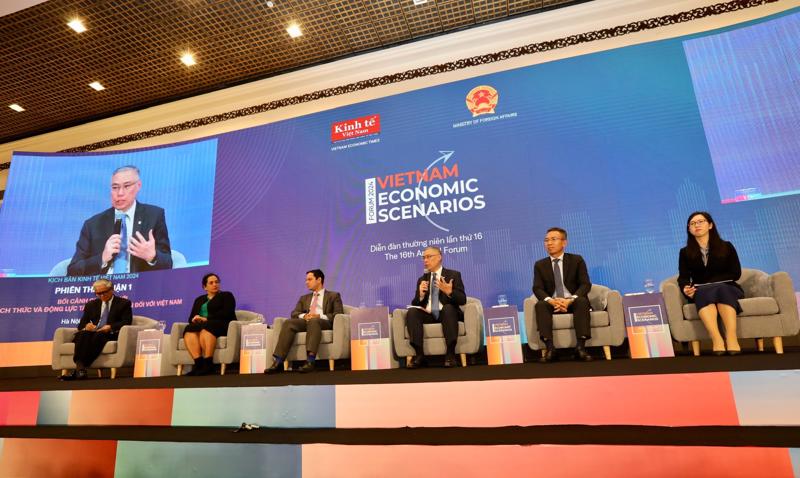In addition to the driving forces needed for Vietnam’s economy to grow further in 2024, there are also many lingering global challenges that will affect the country, analysts said during the first Discussion Session at the Vietnam Economic Scenario Forum 2024, with the theme “Promoting mechanisms and policies, vigorously implementing new growth drivers,” organized by VnEconomy / Vietnam Economic Times (VET) and the Ministry of Foreign Affairs (MoFA) on January 11 in Hanoi.
Ms. Dorsati Madani, Senior Economist at the World Bank (WB), said there has been a significant surge in commodity prices, triggering global inflation. Subsequently, interest rates, particularly in developed countries, rose in an attempt to curb inflation. This created a challenging period for the global economy over the past few years. Looking ahead, the impact of these events continues to be felt, with lingering effects on consumption patterns in the post-Covid recovery. Moreover, the exhaustion of savings accumulated over four decades adds to the complexity.
Globally, the financial sector remains constricted, characterized by rising interest rates worldwide. For example, China, grappling with domestic economic challenges, is also experiencing a deceleration despite government efforts to stimulate recovery. Ms. Madani said that this global economic deceleration will inevitably affect Vietnam, influencing growth projections, which are currently set at around 5.05 per cent. However, maintaining this estimate hinges on external factors and the domestic landscape. Notably, low private investments and a slowdown in consumption domestically pose challenges to a swift recovery.
Green transition has been considered one of the main driving forces for Vietnam’s economy in recent years and also in 2024. However, Vietnam’s green transition still has many challenges in need of solutions. “The first challenge is that action regarding the green transition in businesses, especially small and medium-sized enterprises (SMEs), is still weak,” said Mr. Pham Van Thinh, CEO of Deloitte Vietnam. “Therefore, all businesses need to turn their words into action.”
The second challenge lies in funding for the green transition. According to a survey by the Ministry of Planning and Investment (MPI), 98 per cent of businesses in Vietnam lack sufficient resources for the green transition, and this is expected to be a long-term challenge. “Hence, financial support from the government and assistance from foreign organizations are crucial,” Mr. Thinh said.
The third challenge is labor resources. About a quarter of the global workforce will be affected by climate-related issues. Vietnam is currently experiencing a significant shortage of labor in the mining industry.
“However, the green transition will create a large number of jobs, with 300 million needed worldwide for the task,” he went on. “During the green transition, there will be a shift in workplace skills, putting pressure on SMEs.”
According to Ms. Madani, the real estate sector has been particularly affected and faces ongoing friction that necessitates thoughtful policy interventions. “A gradual recovery is envisioned, calling for both domestic public and private investments to support economic revival, alongside an anticipated resurgence in exports,” she said. “Encouragingly, international trade is projected to grow 2.3 per cent, presenting opportunities for Vietnam’s exports and manufacturing sector.”
Additionally, favorable expectations surround softening oil prices, offering relief globally and particularly benefiting Vietnam. Ms. Madani emphasized that while a complete return to pre-Covid economic conditions may be distant, progress is anticipated, supported by strategic policies and regulatory measures, potentially aided by international cooperation.
In order for Vietnam to seize the driving forces and overcome the challenges in 2024, Mr. Suan Teck Kin, Head of Research, Executive Director, Global Economics and Markets Research, at the United Overseas Bank (UOB), believes it is essential to identify the key focus areas. “With three decades of experience in this field, we have actively facilitated investments and job creation, utilizing our workforce, skills, and strategic location, and navigating the dynamics of US-China relations and the Asian supply chain,” he said.
He added that diversification should be considered. Exploring new export markets beyond the US while recognizing Vietnam’s diplomatic achievements in connecting with Southeast Asia offers promising opportunities. Enhancing productivity through skills development, rescaling, and upskilling is paramount for maintaining competitiveness. Fiscal policies, as demonstrated during last year’s challenging external environment, play a crucial role in supporting growth.
Additionally, the long-term focus includes green financing plans and social opportunities for SMEs. “These considerations reflect a comprehensive approach to sustaining growth and addressing challenges,” he told the gathering. “Commitment to these aspects not only ensures competitiveness but also contributes to the well-being of our workforce.”









 Google translate
Google translate